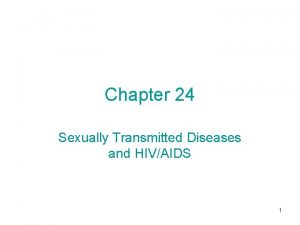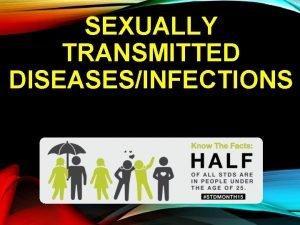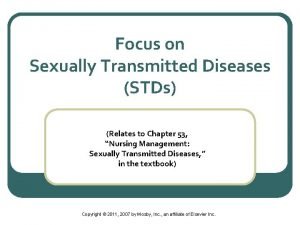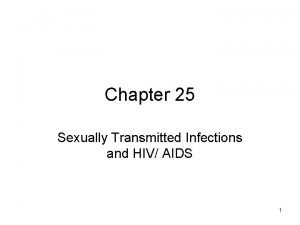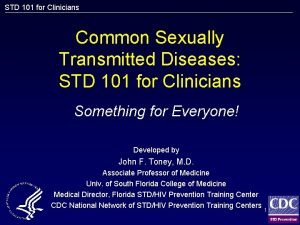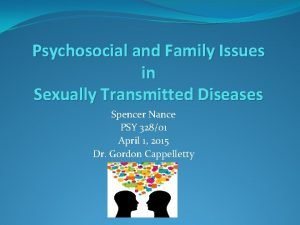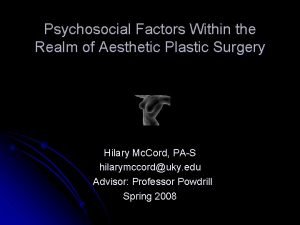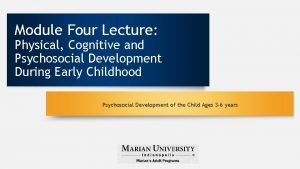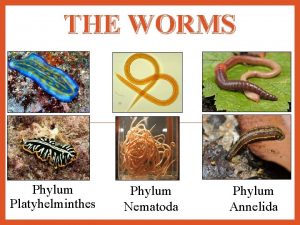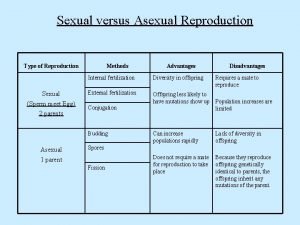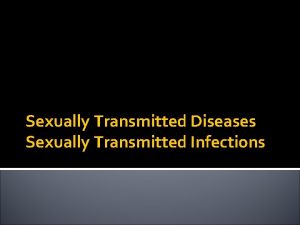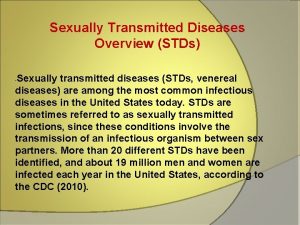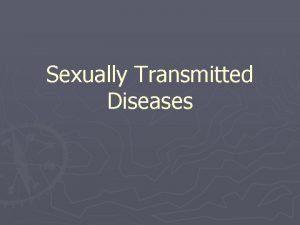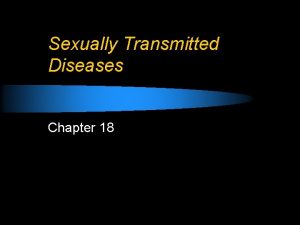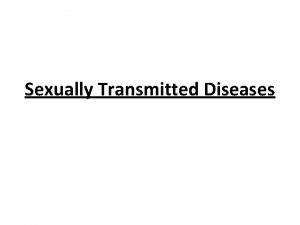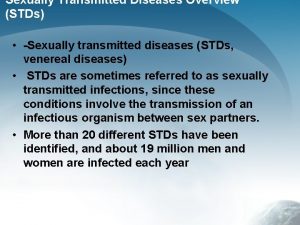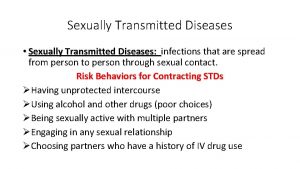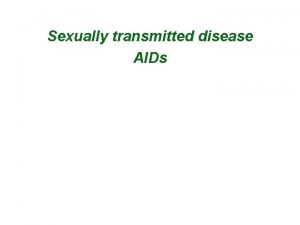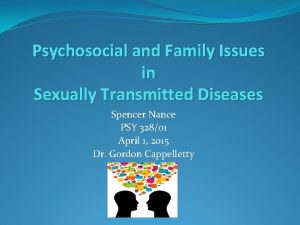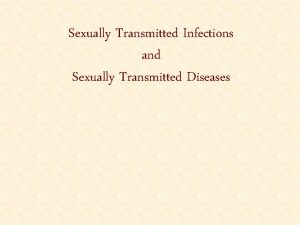Psychosocial and Family Issues in Sexually Transmitted Diseases













- Slides: 13

Psychosocial and Family Issues in Sexually Transmitted Diseases Spencer Nance PSY 328/01 April 1, 2015 Dr. Gordon Cappelletty

Introduction �Can be a life-long health challenge �Health threat to the individual and intimate partner �May face a multitude of psychosocial and family issues �Conflicts and stressors in relationships add to existing challenges of living with an STD (Gottlieb et al, 2011)

Chlamydia �Most common STD in the U. S. �Can result in multiple adverse health conditions �Individuals may be unaware they are carriers, putting others at risk �Diagnosis can cause shock, disbelief, isolation, and shame �Uncertainty can cause anger, fear, distrust, and feelings of betrayal (Gottlieb et al, 2011)

Psychosocial Issues in STDs �Fear of intimate rejection and resentment by partner �Fear of social isolation from family �Feelings of fear and embarrassment when seeking treatment or confiding in others �Psychological counseling can be beneficial (Gottlieb et al, 2011)

Psychosocial Issues Regarding Reproductive Health �Anxiety about fertility and childbearing ability �Health risks to mother and fetus �Anxiety over future sexual relations �Showing concern can lead to safer sexual practices (Gottlieb et al, 2011)

HIV and AIDS �Sexual contact – one route of transmission �Quality of life (sense of happiness and satisfaction in life) can be profoundly affected �Diagnosis of HIV/AIDS can impact physical, mental, and psychosocial well-being �Lack of understanding from family and friends can cause depression and withdrawal �Break down in social support systems can lead to isolation �May seek out alternative methods for stress reduction such as alcohol or drug abuse (Basavaraj, Navya, & Rashmi, 2010)

Problems Associated With HIV/AIDS Disease Progression �Disease progression makes it difficult to sustain an active social life �Decreased energy and fatigue affects physical and psychosocial well-being �Patient may become withdrawn and avoid social interaction �Increased stress and lack of coping skills is directly related to HIV disease progression to AIDS �Counseling can be beneficial (Basavaraj et al, 2010)

Cindy’s Story �https: //www. youtube. com/watch? v=ICPp 5 a 8 Jv. YE&in dex=10&list=PLY 018 Ggg. FCXM 863 Kg. Fco. BFcp. R 2 j. VERV Ri (SANAC, 2014)

Coping with an STD Diagnosis �Patients often have difficulty accepting the diagnosis of an STD, especially those that could have devastating health consequences �Denial is associated with depression and low selfesteem �Some individuals use denial as a coping mechanism �Depression can lead to social isolation �Risk of suicide is increased (Basavaraj et al, 2010)

Correlation Between Partner Abuse and STDs �Individuals in abusive relationships are at a higher risk for contracting a sexually transmitted disease �Often forced to have unprotected intercourse with partners who fail to practice monogamy �Individual must deal with the negative health effects of having an STD and psychological effects of partner abuse (Hess et al, 2012)

Education and Understanding �STDs affect the individual and those around them �Relationships are negatively impacted �Lack of knowledge further impacts the problem �Testing is vital so individuals are aware of their health status � Take steps to avoid further disease transmission �Counseling is beneficial to optimize patient outcome (Hess et al, 2012)

Conclusion �There are many different types of STDs �Some are more serious than others �Those who are infected must take responsibility in preventing further disease transmission (Gottlieb et al, 2011)

References � � References Basavaraj, K. H. , Navya, M. A. , & Rashmi, R. (2010). Quality of life in HIV/AIDS. Indian Journal of Sexually Transmitted Diseases and AIDS, 31(2), 75 -80. Gottlieb, S. L. , Stoner, B. P. , Zaidi, A. A. , Buckel, C. , Tran, M. , Leichliter, J. S. , Berman, S. M. , & Markowitz, L. E. (2011). A prospective study of the psychosocial impact of a positive Chlamydia trachomatis laboratory test. Sexually Transmitted Diseases, 38(11), 1004 -1011. Hess, K. I. , Javanbakht, M. , Brown, J. M. , Weiss, R. E. , Hsu, P. , & Gorbach, P. M. (2012). Intimate partner violence and sexually transmitted infections among young adult women. Sexually Transmitted Diseases, 39(5), 366 -371. South African National Aids Council (2014). World AIDs day – Cindy’s story and experience of HIV stigma and discrimination [Video file] Retrieved March 27, 2014 from http: ///www. youtube. com/watch? v=ICPp 528 Jv. YE&index=10&list =PLY 018 Ggg. FCXM 863 kg. ERVFco. BFcp. R 2 j. VR
 Chapter 24 sexually transmitted diseases and hiv/aids
Chapter 24 sexually transmitted diseases and hiv/aids Chapter 24 lesson 1 sexually transmitted diseases
Chapter 24 lesson 1 sexually transmitted diseases Std
Std Sexually transmitted diseases
Sexually transmitted diseases A bacterial std that usually affects mucous membranes
A bacterial std that usually affects mucous membranes Std
Std Psychosocial issues
Psychosocial issues Body structure of porifera
Body structure of porifera Psychosocial and aesthetic factors
Psychosocial and aesthetic factors Define physical cognitive and psychosocial development
Define physical cognitive and psychosocial development How do whales reproduce sexually
How do whales reproduce sexually Nematoda segmentation
Nematoda segmentation Invertebrates characteristics
Invertebrates characteristics What is sexually dimorphic mean
What is sexually dimorphic mean
